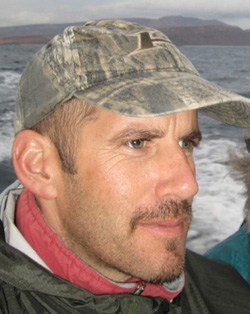UC Santa Cruz alumnus Hoyt Peckham has been awarded a 2014 Pew Fellowship in Marine Conservation to expand on his work with coastal communities in Mexico to support sustainable fishing practices. Peckham, who earned his Ph.D. in ecology and evolutionary biology at UCSC in 2008, is working with local fishers and their cooperatives to restore value in their fisheries, reinforcing their sustainability practices by increasing demand for their seafood.
The Pew Fellows Program in Marine Conservation awards recipients $150,000 for a three-year project to address conservation challenges facing our oceans. Peckham developed SmartFish, a nonprofit social enterprise that enables small-scale fishermen to produce high quality, sustainably-caught seafood by using ocean-friendly practices, such as hand lines and other gear that reduce bycatch. Pew's award will allow him to expand this program, first developed in southern Baja California, throughout northwest Mexico and to determine its international feasibility.
"Fisheries sustainability is really about striking a balance so that both fishermen and our oceans benefit," said Peckham. "We're harnessing consumer demand for high quality, high sustainability seafood to reward fishermen for fishing more responsibly, taking an entrepreneurial approach to improving fisheries. I look forward to offering this opportunity more broadly across the region and exploring its international prospects."
Peckham began working with fishing communities in Baja California as a UCSC graduate student, when he investigated the impact of longline fishing on the endangered loggerhead sea turtle. In the course of his thesis research, Peckham discovered that small-scale fisheries can have catastrophic effects on the turtle population. He began working with local fishermen in Baja California to study loggerhead habitat use and bycatch problems. This work eventually led him to found SmartFish to help small-scale fishers develop more sustainable practices.
In many cases, the value of fish is lowered by handling, processing, and transportation practices that harm its quality. To compensate for low fish prices, many fishermen are forced to increase their catch. To do so, they generally sacrifice quality, which in turn can drive prices even lower, forcing fishermen to catch even more, jeopardizing fish stocks and their own livelihoods. To break this cycle, Peckham and the SmartFish team help fishermen produce their fish at highest quality, differentiate it from competitors, and sell it in premium markets. In the end, fishermen are able to earn more while catching less, ultimately reducing overfishing and securing their livelihoods.
"Overfishing in small-scale fisheries jeopardizes the livelihoods and well-being of many coastal communities, especially in the developing world," said Joshua S. Reichert, executive vice president and head of environment initiatives for The Pew Charitable Trusts. "Dr. Peckham's work is giving local fishermen a chance to restore the value of the fish they manage."
Peckham is the director of SmartFish, based in La Paz, Mexico, and is a visiting fellow at Stanford University's Center for Ocean Solutions.



